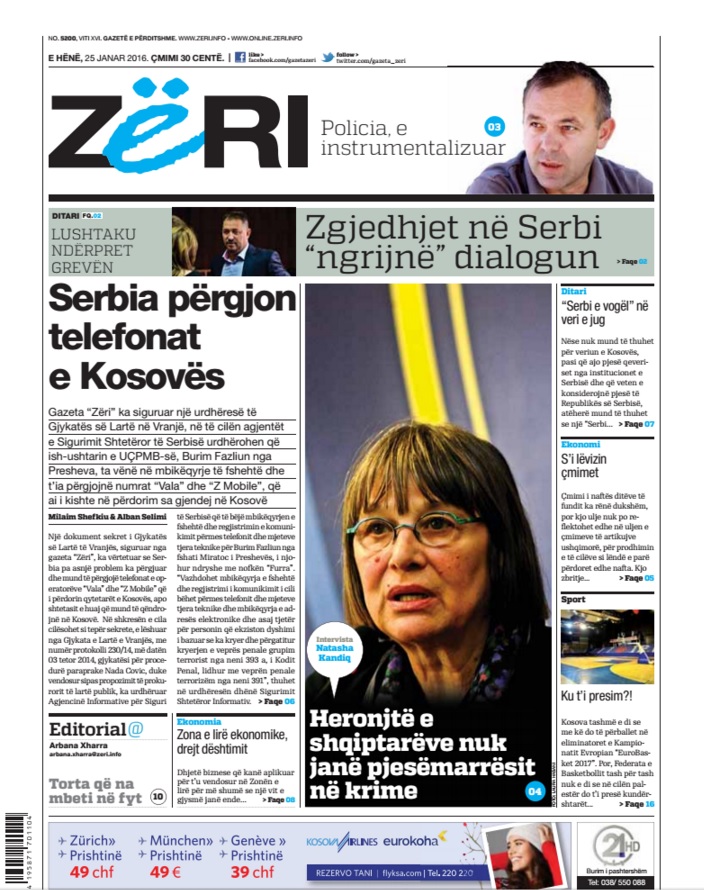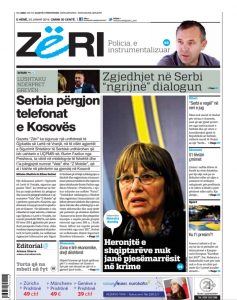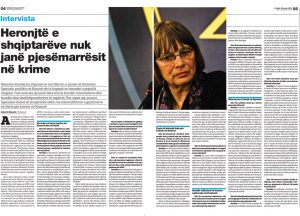
26.01.2016.
Criminals are not Albanian heroes
Interview: Nataša Kandić
By Albatrit Matoshi, Zeri
When you spoke about the start of talks between Kosovo and Serbia, you said that the problem of missing persons would be discussed and resolved. So far, very little has been done, even though it is well known that more than 1,600 ethnic Albanians and hundreds of ethnic Serbs are still listed as missing. How can we demand that reconciliation take place between the two peoples, with so many people still missing on both sides?
There has been no mention of the past, or of facing the past, war crimes and war crimes trials in the Brussels talks, despite these problems being the subject of this “dialogue” and a consequence of the armed conflict and the gross human rights violations it involved. They (the talks) are spoken of as a “contribution” to the normalization of relations, but are, in fact, far removed from the core of the problem. Just like in the Kumanovo agreement, there is not a single mention of the missing. As time passes, the issue of their fates is becoming an even heavier political burden. I am sure that there are more secret mass graves to be uncovered in both Serbia and Kosovo, and there are also traces of bodies having been burnt. However, discovering secret graves and the facts about where and when the bodies were burned, always leads to high ranking officers, as was the case with the secret grave in the village of Rudnica, in Raška. The existence of this mass grave was revealed by a witness. Under pressure from the EU, the Serbian government then had to exhume this grave; but it continues to ignore all the evidence published by the Humanitarian Law Center – evidence that the grave leads to the villages in the municipalities of Gllogoc/Glogovac and Drenica, where, in April and May of 1999, units of the 37th Motorized Brigade killed at least 300 civilians, and then, under orders from Ljubiša Diković (Lieutenant-Colonel and Commander of the brigade at the time) to “sanitize the battlefield” (i.e. clean it up), a still unknown number of bodies of murdered civilians, all of them victims of war crimes, were transported to Serbia and hidden at locations owned by the VJ. I do not expect the issue of the fates of the rest of the missing to be resolved quickly, primarily because discovering secret graves would also reveal who was responsible for perpetrating and covering up the crimes.
The names of the missing are known, but until all the mortal remains of their killed relatives have been handed over to their families so they can give them dignified burials and mark their graves, all memory of their fates will remain within the families. Post-mortem remains are crucial as a physical symbol for remembering the victims. Only the actual physical presence of the body gives the victims the power to demand that the dead be remembered. Without the body, there is no funeral, no religious burial ritual, no grave… Without the graves, there is no public memory of the dead, everything stays within the memories of the family…
Reconciliation is a process, and discovering secret graves and the fates of the missing are part of this process. Reconciliation is a process with permanent effects. It depends on the individual, but, above all, on the institutions of state and their willingness to apply mechanisms which will prevent the repetition of crimes and violence. Registering the victims and establishing the circumstances of their deaths thus has the power to advance the process of reconciliation with others, seen as our equals.
How important is it to resolve the issue of missing persons, and what mistakes in this regard have the two countries made so far?
It is a mistake not to have the issue of missing persons as a topic of talks between the Prime Ministers of Kosovo and Serbia. Had there been protests organized in Kosovo demanding that the two governments disclose information about the fates of around 1,000 Albanians and 450 Serbs, I firmly believe that the issue of missing persons would have been put on the Brussels dialogue agenda.
Do we then need to establish a regional commission which would be able to deal with the issue of missing persons, and are the relevant countries ready for such a move?
In my opinion, a regional approach makes it possible to communicate with the victims from the “enemy community”. It was shown that the Albanians and Serbs who took part in the regional process of consultations about the mandate of this regional commission were very surprised when they heard testimonies about experiences much like their own. This proved crucial in forming their opinion that “the victims need to be separated from the enemy”. Another big achievement of these regional communications was made when the participants agreed that registering all the victims’ names was the first step towards reconciliation, and that all victims were equal in death. With respect to the missing, a regional approach makes it easier to uncover “secrets”. Experience has shown that witnesses of crimes are more likely to decide to reveal what they know after hearing testimonies from the families of missing persons from the “enemy community”.
Aleksandar Vučić, the Serbian Prime Minister, offered an apology to the victims in Bosnia, but not to the victims in Kosovo. Can any apology made by Serbia help improve its relations with Kosovo?
In the former Yugoslavia, an apology is spoken of in the sense of the apology made by Willy Brandt. However, we do not have such a statesman. There are demands from Kosovo, both from the politicians, and the victims’ associations and CSOs, that Serbia apologize to the Albanians for all its war crimes, claiming that there can be no reconciliation without such an apology. On the other side, the Serbian victims’ associations have expressed strong doubts with respect to the number of Albanian war victims (8,693 civilians and 2,122 members of the KLA), believing the majority of them to be KLA fighters killed in combat, all the while speaking of Serbian victims in the thousands. That’s why it is necessary to establish the names and the circumstances of the deaths of all the victims. Once we know the names, there will be no more room to manipulate the figures, but there will be room left for an apology. It is then that an apology will have the force of public acknowledgement and acceptance of facts. This is the sequence I advocate.
How do you see the inclusion of the Civil Protection Service in Severna Mitrovica into Kosovo’s institutions? Many of its members are suspected of having committed war crimes. Do you have any information about any of them having participated in the atrocities perpetrated in Kosovo?
Objectively speaking, the inclusion of illegal Serbian institutions into Kosovo’s institutions contributes to state-building in Kosovo, and in this sense, it represents a step in the right direction. The public perception is another thing. The belief that every Serb who wore a uniform is a war criminal is prevalent in Kosovo. First of all, this is not true. Secondly, it strengthens the perception among the Serbian public that all the Albanian victims were actually members of the KLA, or “terrorists” killed in combat.
How democratic is the Serbian government, when the Albanian community in the Preševo Valley still doesn’t have its own school textbooks?
We’ve had cases of diplomas not being recognized and a ban on textbooks from Kosovo and Albania, but the situation today is better. The police are ethnically diverse, and have conducted themselves very well with respect to the reception of refugees. The photograph of an Albanian police officer kissing a small boy, a refuge from Syria, was published all over the world. That police officer is now being approached by random people every day – they greet him and just love taking selfies with him. He has done more on bringing the two ethnic communities closer together than any state institution.
How would you comment on the building of a huge Serbian military base in the Preševo Valley, if we take into account that this triangle of land along the border is already overflowing with military and police units?
Yes, there are too many military in the Preševo Valley. I am against the building of this base and concentrated military deployment in ethnically diverse areas such as Preševo, Bujanovac and Medveđa.
Kosovo was recently visited by General Ljubiša Diković, whom you have accused of war crimes in the region of Drenica and Dukagjin. Should KFOR have allowed him to visit the scene of the crime?
The meeting between General Diković and the KFOR command at their base shows that KFOR doesn’t follow the politics of the Kosovo government. In any other country, an oversight such as this – inviting and hosting General Diković in Kosovo in the light of the fact that the Humanitarian Law Center has accused him of having had knowledge of the war crimes perpetrated there by members of his brigade and of covering up the evidence – would result in the sacking of KFOR’s commander. In Kosovo, all of this ended with KFOR explaining to the government that the commander had not been informed about its decision to ban the Serbian Army Chief from entering Kosovo.
Why do Serbian politicians defend General Diković?
When the HLC published the Rudnica Dossier, which showed his involvement in the transport and cover-up of the bodies of murdered Albanian villagers in Serbia, the Serbian President awarded him a medal. The Prime Minister remains silent on the matter, but he has backed the establishment of RECOM. The lawsuit filed by Diković against me and the HLC will be decided in his favour, and the court will rule that I have damaged his reputation, honour and dignity. However, the court cannot stop the facts about General Diković’s involvement in war crimes in Kosovo from being brought to light. He will get a ruling in his favour, but the fact remains, and will forever remain, that the mass grave in Rudnica was created following his order to “sanitize the battlefield” in the villages in the municipalities of Glogovac and Skenderaj, where the 37th Brigade was deployed at the time, commanded by (then) Lieutenant-Colonel Ljubiša Diković. That will remain forever, while the verdict itself will, in some better future at least, serve as an example of the manipulation of courts for political ends.
My personal estimate is that General Diković will get a verdict in his favour, but he will not remain Chief of Staff, and he will be retired. I believe that the Serbian Prime Minister has a hard time explaining to the State Department and the EU why his government has not reacted to the discovery of the mass grave in Rudnica and the allegations made by the HLC that this mass grave heavily implicated the Serbian Army Chief of Staff.
What are the consequences that you personally are suffering for condemning the crimes perpetrated by individuals seen as patriots in Serbia? A trial against you is already underway in Serbia. Do you fear that you will be punished by the court?
In the past 15 years, there have been at least 30 civil and several criminal lawsuits brought against me. Numerous police officers have filed lawsuits for damages against me for allegedly tarnishing their personal reputations by speaking badly about police officers in the criminal lawsuit filed by the HLC against the Commander of the 37thBrigade. Although the court has rejected these lawsuits, it has accepted the lawsuit filed by General Diković, and has openly sided with the Army Chief of Staff by banning all press from reporting on the trial from the courtroom. Everything else – and I’m referring to the accusations that I am “selling” Serbian generals, or “protecting” Croats, Muslims and Albanians, or blind to the suffering of the Serbian victims – all of that is normal in a situation like the one we have in Serbia and the region. I am not complaining, and I am at peace with what I do.
What is your opinion on the Special Court, which has been approved by Kosovo’s Assembly?
It would be best to hold the trials in Kosovo in front of the public eye. However, that is not possible at this time, primarily because of the potential violence that some groups might resort to in order to block the proceedings. The establishment of a court with powers to prosecute the crimes that the Hague Tribunal could not (as it only had jurisdiction over the crimes perpetrated before the end of June 1999) and provide the witnesses with better protection than the Tribunal and other courts in Kosovo – and which will be successful, I hope, in convincing the public that those involved in the crimes against minorities and alleged collaborators are not heroes of the Albanian people (still a taboo topic in Kosovo) – is conducive to the rule of law. Were it not for U.S. backing, no one from Europe would be able to realize this idea of a court to deal with crimes perpetrated after June of 1999.
The work of the Special Court has also to be followed by a surge of trials in Serbia for crimes perpetrated in Kosovo. Otherwise, many, both in and outside Kosovo, will raise the issue of justice for more than 8,000 Albanian civilian victims. Some Serbian generals have been convicted of being part of a joint criminal enterprise, but there have been no trials in Serbia against officers and soldiers or policemen accused of specific crimes – such as those in Meje, Đakovica, Korenica, Bela Crkva, Kruša, Pokleka and many other places where mass crimes took place.
The prevalent belief in Kosovo is that such a court would try and punish only members of the KLA, and not the actual criminals. What is your comment?
At the end of his investigation, Clint Williamson said that indictments would be raised against those members of the KLA who perpetrated crimes against humanity. His words should be believed, as he is a U.S. prosecutor, and a good one. He knows all of us well, and everything we’ve done since 1991.
(Published on January 25th, 2016)
















